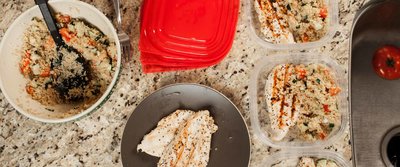You know that you have to eat several times per day, so why is that that so many people leave their meal planning to the last minute and wonder why they can never follow a healthy nutrient-rich diet?
21 Days & Top 3 Tips
Here are my top three tips that everyone, including you, can start using today. Turning your old habits into new ones takes 21 days. Remember this magic number and try these tips. Mark the 21-day point on your calendar.
1. Cook Your Meals In Advance & Keep It Simple
Preparing your meals in advance ensures that you won't be tempted to make a detour into a fast food establishment. If you want to have a gourmet meal for dinner every day, you may be setting yourself up for disappointment since gourmet eating may take more prep time than you have.
Plan ahead by cooking your meals every other day, providing you with enough food for the next two days. If you are really busy, keep Sundays and Wednesdays as your 'chef' days. I normally eat breakfast at home unless I am doing morning cardio and am not returning home right away.
Breakfast Suggestions
Keep your breakfast (meal #1) simple, with foods such as oatmeal, yogurt, eggs, cottage cheese and whole wheat toast with almond butter (or organic peanut butter).

{{caption}}
Choose the foods that will equal a carbohydrate and protein. Healthy fats will also be included with the protein choice.
Meal 1: Sample Choices
Carbs Oatmeal Protein Egg whites Fats Two full eggs (fat comes from the yokes)
For your next meals, which should be spaced every 2.5 to 3 hours apart, choose foods such as:
- chicken
- turkey
- yams/sweet potatoes
- almonds
- whole wheat pasta & breads
- avocados (with a sprinkle of lemon juice)
- brown rice sushi (yes, it's out there!)
- fish (salmon, tuna, snapper, orange roughy, tilapia, swordfish, halibut) and brown rice
Also remember your fibrous vegetables, such as:
- broccoli
- asparagus
- spinach
- green beans
- brussel sprouts
- peppers
- cucumbers
Many of my suggestions are foods that are low in the glycemic index, though there are many other healthy choices such as raisins, peas, corns, carrots, and white potatoes. See a complete list of foods below.
For my meals #2, #3, and #4, I will plan ahead the night before by cooking a large amount of chicken in the oven. Simply spray some PAM® on a baking pan, lay out your chicken and sprinkle on any spices you like. Spices will be your best friends when it comes to making your meals enjoyable.
While my chicken is in the oven, I will cook a large amount of rice or sweet potatoes, and steam some green beans and/or broccoli.
Meals 2-4: Sample Choices.
Carbs: ½ cup rice and 1 cup of green beans Protein: 1½ chicken breasts Fat: Flax oil
If I am preparing for a show or photoshoot, I will leave the complex carbs out and feast on a massive salad featuring grilled chicken or fish, with fibrous carbohydrates and a delicious vinaigrette made from balsamic vinegar, flax oil, lemon juice, and a sprinkle of Splenda®. Sometimes I will add seasoning, too.
2. Divide Your Meals Into Portion Sizes
Get yourself plastic containers that are the correct size for your mini-meals on the go. If you are not sure what a portion size looks like, remember this:
Container Size Guide
1 oz. meat: size of a matchbox 3 oz. fish: size of a checkbook 1 oz. cheese: size of four dice 1 medium potato: size of a computer mouse 2 tbsp. peanut butter: size of a ping pong ball 1 cup pasta: size of a tennis ball 1 average bagel: size of a hockey puck 3 oz. meat: size of a deck of cards or bar of soap (the recommended portion for a meal) 8 oz. meat: size of a thin paperback book

{{caption}}
Having your meals prepared ahead and stored in a cooler with you will triple your chances of achieving your fitness goals. Look at the amateur and pro competitors. Whether they are male or female, competing in fitness and figure or bodybuilding, all of them will plan their meals in advance.
If you are not at all hungry three hours after your last meal, you may have consumed too many calories. Try making your portion sizes a little smaller.
3. Always Have A Bottle Of Water With You
Some vital H2O facts:
- Blood is 83% water
- Muscles are 75% water
- The brain is 74% water
- Bone is 22% water
It may feel like a hassle at the start but having water with you will make a major difference in your life. Water is a necessity. Your body needs water to digest and absorb vitamins and nutrients. Water also detoxifies the liver and kidneys, and carries away waste from the bod, and makes digestion possible.
Fiber alone cannot aid proper digestive function. Feeling dehydrated? You may be, and not even know it! Without water, your blood is literally thicker, and your body has to work much harder to cause it to circulate.
As a result, your brain becomes less active, it's hard to concentrate, your body feels fatigued, and you just tire out. Aim for a gallon a day. Before you know it, you will start to crave and love your water. Add lemon for a new taste you'll come to enjoy.
This Is About You!
Are you worried that people are going to joke about your bringing your own food to work, or that you can't have lunch with the rest of the gang? Remember your reasons for why you planning your meals ahead.
If your friends and work associates joke and have an issue about how you are eating they certainly have some issues of their own. Remember this: I will be with you every step of the way.
So mark down on your calendar that for the next 21 days you are going to plan your meals ahead. In three weeks, by creating healthy meals in advance you will have noticed not only that your clothes are fitting better but you are also saving time and money.
Recommended Food Sources
The following are sources of proteins, carbohydrates, fibrous vegetables, and fats.
Protein
The richest sources of protein are animal foods such as chicken, meat, fish, cheese and eggs. However, plant proteins are believed to be healthier because of their lower fat content.
Other sources of protein include:

{{caption}}
- Whole grains
- Rice
- Corn
- Beans
- Legumes
- Oatmeal
- Peas
- Peanut butter
For vegetarians, vegans and/or those who do not eat meat, fish, eggs, or dairy products, it is important to eat a variety of these other foods in order to get enough protein.
To Use Our Handy Protein Finder, Click Here.
Protein supplements are a fast and efficient way to gain all your high-protein diet needs, however when you have access to real foods choose them for their nutritional value.
Simple Carbohydrates
- White and brown sugar
- Fruit sugar
- Corn syrup
- Molasses
- Honey
- White flour
- White bread
- Candy & alcohol
These foods are usually high in calories and offer very little nutritional value.
Fats
Good fats include the 'good' vegetable oils, such as olive, canola, soy oil, flax, & Udo's oil. Always use oil in place of all-animal fats and solid fats (such as shortening). Nuts, olives, seeds, and avocado are good sources of monounsaturated fat.

